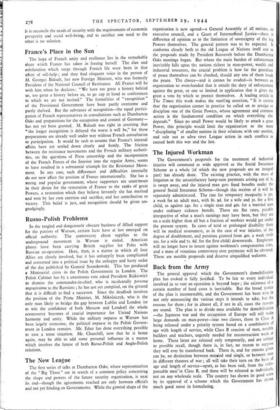France's Place in the Sun
The hope of French unity and resilience lies in the remarkable share which France has taken in freeing herself. The élan and exhilaration which surge through French life were born in that effort of self-help ; and they find eloquent voice in the person of M. Georges Bidault, her new Foreign Minister, who was formerly President of the National Council of Resistance. All France will be with him when he declares: " We have too great a history behind us, too great a history before us, to go cap in hand to conferences to which we are not invited." The formalities of " recognition " of the Provisional Government have been partly overcome and partly shelved. But the substance of recognition—the equal partici- pation of French representatives in consultations such as Dumbarton Oaks and preparations for the occupation and control of Germany— has not yet been granted. M. Bidault was right in asserting that " the longer recognition is delayed the worse it will be," for these preparations are already well under way without French consultation or participation. It would be rash to assume that France's internal affairs have yet settled down clearly and firmly. The friction between the resistance movements and the French military authori- ties, on the questions of Press censorship and the incorporation of the French Forces of the Interior into the regular Army, seems to have resulted in a substantial triumph for the Resistance Move- ment. In any case, such differences and difficulties internally do not now affect the position of France internationally. She has a strong and popular government, whose supporters are unanimous in their desire for the restoration of France to the ranks of great Powers, a restoration which they believe fervently she has merited and won by her own exertion and sacrifice, and her contribution to victory. This belief is just, and recognition should be given un- grudgingly.


























 Previous page
Previous page